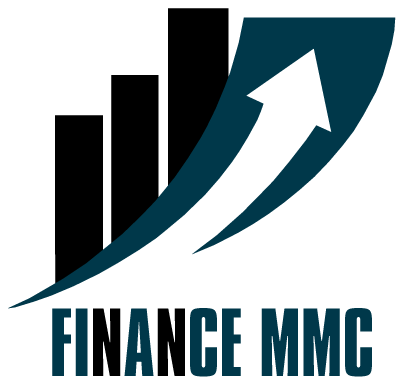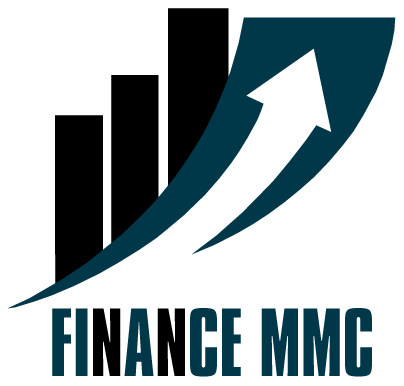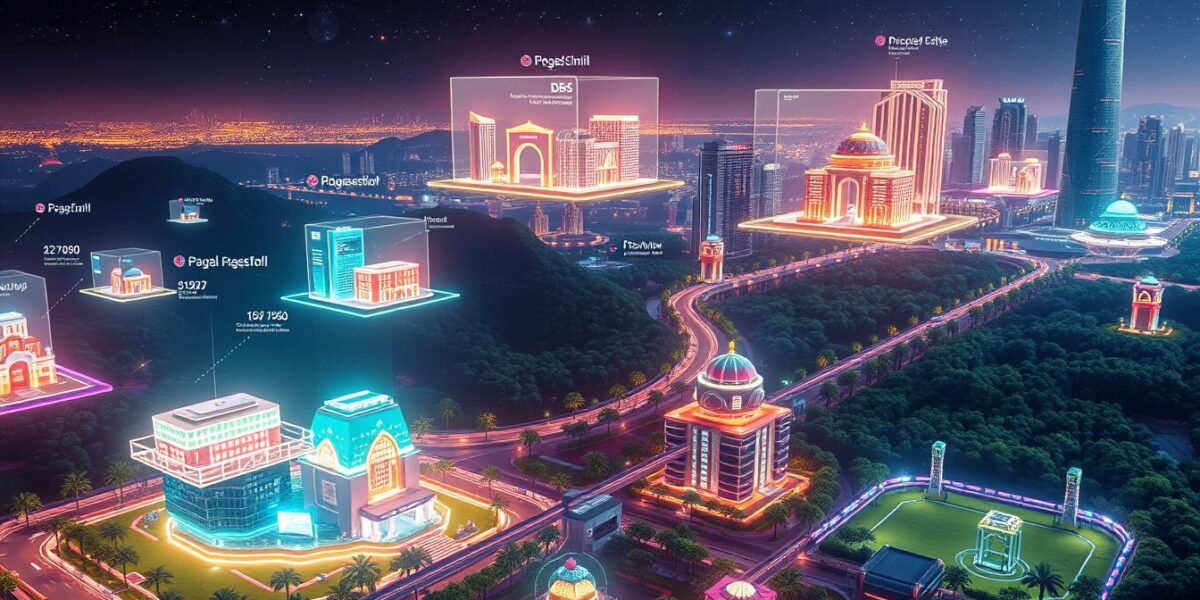Discover the essentials of digital real estate investing and learn how to build wealth through virtual property ownership. Your complete guide to this emerging market.
The global metaverse real estate market is set to hit $5 billion by 2032. This shows the huge potential of digital real estate investments. It’s a new area for smart investors looking to make money online.
From websites to domain names, there are many chances to make money. This new market is changing the way we think about real estate.
Digital real estate has grown with Web 2.0 and more online activity. It includes owning online properties that can make money on their own. This includes websites, domain names, social media, apps, and even virtual land in the metaverse.
The COVID-19 pandemic has made digital real estate even more popular. More things are happening online, so people want a piece of the digital world.
Investing in digital real estate has big benefits. It’s cheaper to start than traditional real estate. You can reach people all over the world. And you can make money without much work.
As the digital world keeps growing, smart investors see the value in this new area. They know it’s a big change in the real estate world.
Key Takeaways
- The global metaverse real estate market is expected to reach $5 billion in value by 2032, highlighting the tremendous growth potential of digital real estate.
- Digital real estate encompasses various online assets, including websites, domain names, social media accounts, and virtual properties within the metaverse.
- Investing in digital real estate offers lower entry costs, global market access, and the potential for passive income streams with minimal maintenance.
- The COVID-19 pandemic has accelerated the demand for digital real estate as more activities and transactions have shifted online.
- Savvy investors are recognizing the compelling value proposition of this emerging asset class and its transformative impact on the real estate landscape.
Understanding Digital Real Estate Fundamentals
In today’s digital world, a new kind of real estate has appeared – internet domain investing and web-based real estate. This new field includes online assets like websites, blogs, and social media accounts. It also includes domain names, mobile apps, YouTube channels, and more. As the internet grows, so does the chance to make money from owning online spaces.
Definition and Core Concepts
Digital real estate works like traditional real estate, but online. People buy and sell these virtual properties to make money. They can earn through ads, subscriptions, and renting out space. The market has grown a lot, with some domain names selling for millions, showing their value.
Evolution of Virtual Property
The world of digital real estate has changed a lot. Early on, Business.com was sold for $7.5 million in 1999 and then for $345 million in 2007. This showed how valuable these online assets could be. Now, with new tech, things like Non-Fungible Tokens (NFTs) and metaverse properties have come into play, offering even more chances for investors.
Current Market Overview
The global digital real estate market was worth over $1 trillion in 2021. Prices for these properties range from a few dollars to millions, based on their potential. Recent sales, like the $4.3 million Atari property on The Sandbox, show how valuable digital real estate can be today.
| Digital Real Estate Segment | Market Trends and Insights |
|---|---|
| Domain Names | Domain names have extreme value potential, with some selling for millions of dollars. The virtual property market has seen prices increase dramatically from $20 in 2017 to $15,000 in 2022, indicating growing demand. |
| Websites and Blogs | Websites and blogs are lucrative digital real estate assets, with potential for six-figure sale prices. They offer opportunities for monetization through advertising, subscriptions, and e-commerce. |
| Metaverse Properties | Average land prices in popular metaverse platforms like Decentraland, The Sandbox, and Cryptovoxels range from $1,500 to $2,000 per 106 x 106 yards, with top sales reaching $115,000. |
| NFTs and Digital Assets | Non-Fungible Tokens (NFTs) present a substantial profit opportunity, with some selling for multi-millions. These unique digital assets are transforming the way we think about ownership and value in the virtual world. |
| Mobile Apps and E-commerce | Mobile apps and e-commerce stores offer significant profit potential and passive income opportunities in the digital real estate market, as they can generate consistent revenue streams. |
Types of Virtual Properties and Assets
The digital world is growing fast, and virtual real estate is playing a big role. Websites, social media, domain names, and apps are all part of this vast digital landscape. These digital assets open up new ways for people to make money and grow their wealth in the metaverse.
Websites and blogs are common virtual properties. They can make money through ads, subscriptions, and more. Social media accounts with lots of followers are also valuable. They can be used for marketing and making money from content.
Domain names, especially those with “.com,” can be very valuable. They can increase in value over time. Mobile apps, YouTube channels, and Amazon businesses are also valuable virtual properties. They can be developed, used to make money, and sold for a lot.
| Virtual Property Type | Monetization Strategies |
|---|---|
| Websites and Blogs | Advertising, Subscriptions, Information Products, Merchandise, Services |
| Social Media Accounts | Influencer Marketing, Content Monetization |
| Domain Names | Buy and Sell for Appreciation |
| Mobile Apps | In-App Purchases, Subscription Models, Advertising |
| YouTube Channels | Advertising Revenue, Sponsorships, Merchandise |
| Amazon Businesses | Product Sales, Private Label Brands, Affiliate Marketing |
The world of digital land ownership and metaverse real estate is always changing. New types of virtual properties and assets will keep coming. By learning about these, people can make smart choices about their digital investments.
“The metaverse represents a significant shift in how we interact with technology and each other. Virtual real estate is at the forefront of this transformation, providing new avenues for investment, creativity, and economic growth.”
Benefits of Investing in Digital Real Estate
Digital real estate is a fast-growing field with many benefits for smart investors. It offers lower entry costs, access to global markets, and the chance for passive income. This new way of investing is changing how we view real estate.
Lower Barrier to Entry
Starting in digital real estate is easier and cheaper than traditional real estate. Nft real estate and crypto real estate can be entered with a small amount of money. This makes it open to more investors.
Global Market Access
Digital real estate lets investors reach a global market. nft real estate and crypto real estate can be managed from anywhere. This opens up new opportunities worldwide.
Passive Income Potential
Digital real estate can create passive income. This includes renting websites, selling online, and earning from ads. It offers a steady income with little effort, unlike traditional real estate.
Scalability Advantages
Digital real estate grows and changes easily. nft real estate and crypto real estate can be scaled up or changed with technology. This makes it a great choice for growth and profit.
“The future of real estate is digital, and savvy investors are already capitalizing on the incredible potential of this emerging market.”
Popular Digital Real Estate Platforms
The virtual world properties market has grown a lot. Several digital real estate platforms have popped up. They use new tech like blockchain and NFTs to help buy, sell, and manage virtual land and assets.
Flippa is a big name in this field. It’s a marketplace for websites, domains, and online businesses. Here, people can auction off their virtual properties, making it easy to trade digital real estate.
Blockchain-based worlds like Decentraland, Cryptovoxels, The Sandbox, Somnium Space, and Axie Infinity are also popular. They let users buy, develop, and make money from virtual land and assets. They use their own cryptocurrencies and NFTs.
Each platform has its own special features. Some focus on building worlds and being creative. Others are more about gaming and DeFi in the virtual world.
| Platform | Key Features | Minimum Investment | Fees |
|---|---|---|---|
| Flippa | Marketplace for website and online business auctions | Varies | Varies |
| Decentraland | Decentralized virtual world built on Ethereum blockchain | MANA cryptocurrency | Varies |
| Cryptovoxels | Decentralized virtual world with a focus on user-generated content | VOXEL cryptocurrency | Varies |
| The Sandbox | Decentralized gaming virtual world with a focus on user-generated content | SAND cryptocurrency | Varies |
| Somnium Space | Decentralized virtual world with a focus on virtual reality and immersive experiences | CUBE cryptocurrency | Varies |
| Axie Infinity | Decentralized gaming platform where players can earn cryptocurrency by breeding and battling virtual creatures | AXS cryptocurrency | Varies |
These platforms offer many chances for investors and developers. They let people dive into the fast-changing world of digital real estate.
Investment Strategies for Virtual Properties
The virtual real estate market is growing fast, offering many chances for investors. You can buy and hold digital properties or develop and flip virtual assets. Let’s look at the main ways investors are making money in digital real estate and virtual properties.
Buy and Hold Strategy
The buy and hold strategy is simple. It means buying virtual land or properties and keeping them. Investors hope their value will go up as the metaverse grows. With more people wanting digital real estate, prices might rise.
Development and Flipping
For those who like to take risks, development and flipping is exciting. It means making virtual properties better by adding unique features or structures. Then, you sell them for a profit, making money from your hard work.
Rental and Leasing Options
You can also make money by renting out virtual properties. Investors buy spaces and rent them to others. This could be for events, offices, or digital businesses. It’s a steady way to earn money in digital real estate.
Investors can use different strategies to make the most of digital real estate. As the metaverse grows, so do the chances to make money. This makes virtual properties a great choice for smart investors.
Monetization Methods in Digital Real Estate
The digital real estate world offers many ways to make money. You can use websites, domain names, or virtual properties in places like the metaverse. Online assets and internet domain investing are getting more popular. They can be very profitable for those who know how to use them.
One way to make money is through advertising. You can sell ad space or use Google AdSense to show ads. Affiliate marketing is also popular, where you get paid for promoting other products or services. Selling your own digital products, like e-books or online courses, is another good option.
Sponsored content is another strategy. Advertisers pay for blog posts or social media mentions. Virtual properties in places like Decentraland can be used for events, leasing, or selling digital assets.
| Monetization Method | Description | Potential Earnings |
|---|---|---|
| Advertising | Selling ad space on websites or using ad networks like Google AdSense | $2,000 – $10,000+ per month |
| Affiliate Marketing | Earning commissions by promoting other companies’ products or services | $500 – $5,000+ per month |
| Digital Product Sales | Selling e-books, online courses, or virtual assets | $1,000 – $10,000+ per month |
| Sponsored Content | Earning revenue from brands for promotional blog posts or social media mentions | $500 – $5,000+ per post |
| Virtual Property Leasing | Renting out virtual properties in metaverse platforms | $100 – $1,000+ per month |
To succeed in digital real estate, you need to mix different strategies. This way, you can make more money and grow your online business. The key is to find the right methods for your assets, audience, and goals.

Risk Assessment and Due Diligence
Investing in web-based real estate and digital land ownership needs careful planning. You must look into the technical, financial, and legal sides of the digital property. This helps you understand its value and potential risks.
Technical Evaluation
First, check the website’s performance. Look at traffic, engagement, and SEO rankings. Tools like Semrush can show how well the property is seen online. Also, check the website’s speed, security, and how it works on different devices.
Financial Analysis
Next, review the property’s financials. Look at income, expenses, and value. Check how the property makes money and if its value matches the asking price. This helps you understand its financial health.
Legal Considerations
Then, look into the legal side. Check who owns the property and if it’s protected by law. Make sure the seller is trustworthy and the deal is fair. A good website brokerage firm can help with this.
By doing a deep dive into risk assessment and due diligence, you can make smart choices. This way, you avoid financial and legal problems in web-based real estate and digital land ownership. It’s a key step to building a strong digital real estate portfolio.
| Key Factors in Digital Real Estate Due Diligence | Significance |
|---|---|
| Website traffic and engagement metrics | Shows the property’s online presence and growth potential |
| SEO performance and optimization | Checks how easy it is to find the property online |
| Revenue sources and monetization strategies | Looks at the property’s ability to make money |
| Intellectual property ownership and legal compliance | Ensures the property is legally sound and protects against disputes |
| Cybersecurity and data protection measures | Keeps the property and its users safe from online threats |
“Proper due diligence is the key to successful digital land ownership and web-based real estate investments. It’s the foundation for making informed decisions and mitigating risks.”
Getting Started with Digital Real Estate Investment
The digital real estate world is growing fast, offering new chances for investors. You can build a virtual property or buy one that’s already there. Success comes from knowing the basics and taking the right steps.
First, decide if you want to build a website or buy one. Building takes less money but more time. Buying a website is quicker but costs more. Sites like Wix and Google’s Keyword Planner help beginners.
If you’re into metaverse real estate or nft real estate, you have many options. You can invest in virtual land, in-game items, or digital collectibles. Places like Decentraland and Axie Infinity have these assets for sale.
It’s important to research and understand the risks before investing. Digital real estate can be unpredictable. But, by staying informed and diversifying, you can make the most of this exciting field.
| Digital Real Estate Investment Considerations | Key Factors |
|---|---|
| Building a Website |
|
| Acquiring an Established Website |
|
| Investing in Metaverse and NFT Real Estate |
|
The digital real estate market keeps changing. Staying up-to-date with trends and strategies is key. By doing your research and investing wisely, you can explore the many opportunities in this growing field.

Market Trends and Future Outlook
The digital real estate market is set to grow a lot in the next few years. Andrew Kiguel, CEO of Tokens.com, says crypto real estate prices went up by 400% to 500% in 2022. This shows how much people want virtual world properties.
Experts think the global metaverse real estate market will hit a big number by 2032. This will happen because of new tech like blockchain and virtual reality.
Growth Projections
The global real estate market is expected to grow at a 5.00% CAGR from 2024 to 2032. The residential sector will lead, growing at 5.2% CAGR. Commercial, industrial, and retail sectors will also see big growth, at 4.7%, 5.5%, and 4.2% CAGR, respectively.
Emerging Technologies
Blockchain and virtual reality are making the crypto real estate and virtual world properties markets grow. These new techs let people create and interact with digital spaces. The COVID-19 pandemic has made more people use these digital spaces because they are convenient and accessible.
Industry Developments
The real estate industry is changing, focusing on data, tech, and being green. Executives are spending more on digital tools to get better at their jobs. But, the industry faces challenges like high interest rates, cybersecurity issues, and tax policy changes.
“The global metaverse real estate market is expected to reach multimillion-dollar value by 2032.”
Building a Digital Real Estate Portfolio
Creating a diverse digital real estate portfolio is key for investors. It helps them take advantage of the growth in the virtual property market. This means spreading investments across different digital assets like websites, domain names, social media, and virtual land in metaverse platforms.
A well-rounded portfolio might mix income-generating assets with speculative ones. For example, it could include websites that make money with virtual world investments. This way, investors get steady income and the chance for their digital properties to grow in value. Staying updated on market trends and adjusting strategies as needed is crucial for success.
Diversifying investments helps reduce risks and makes the portfolio stronger. As the digital real estate market grows, this strategy allows investors to seize new opportunities. It’s all about making the most of virtual properties and the changing metaverse.


